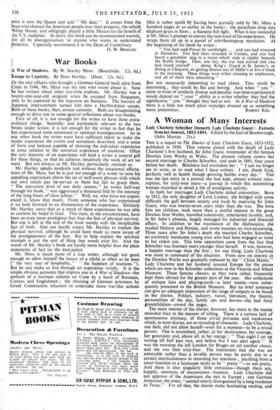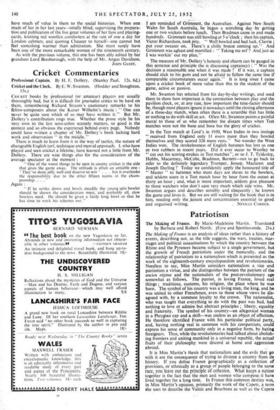A Woman of Many Interests
Lady Charlotte Schreiber (formerly Lady Charlotte Guest) : Extracts from her Journal, 1853-1891. Edited by the Earl of Bessborough. (John Murray. 21s.) Tins is a sequel to The Diaries of Lady Charlotte Guest, 1833-1852; published in 1950. That volume closed with the death of Lady Charlotte's first husband, Sir John Guest, ironmaster of the famous Dowlais Iron Works in Wales. The present volume covers her second marriage to _Charles Schreiber, and ends in 1891, four years before her death. Blindness had overtaken her : " I can no longer see to write, or to read what I have written. I am, thank God, perfectly well in health though growing feebler every day." This was the last entry in a journal she had kept, almost without inter- ruption, for sixty-nine years—a journal in which this astonishing woman recorded in detail a life of prodigious activity.
In both her marriages Lady Charlotte defied convention. Born in 1812, the only daughter of Lord Lindsey, she bridged with some difficulty the gulf between society and trade by marrying Sir John Guest, who was twenty-seven years older than she was. She bore him ten children, took more than a dutiful interest in the great Dowlais lion Works, travelled extensively, entertained lavishly, and, in Sir John's absence, largely managed his industrial and financial affairs. In addition to her translation of the Mabinogion, she studied Hebrew and Persian, and wrote treatises on iron-processing. Three years after Sir John's death she married Charles Schreiber, an extremely handsome young man who had been engaged as tutor to her eldest son. This time opposition came from the fact that Schreiber was fourteen years younger than herself. It was, however, a happier marriage than the first ; for one thing, Lady Charlotte was more in command of the situation. From now on interest in the Dowlais Works was gradually replaced by the " China Mania." Lady Charlotte and her husband scoured Europe for the pieces which are now in the Schreiber collections at the Victoria and Albert Museum. These famous chasses, as they were called, frequently kept them abroad for the greater part of the year. Her collections of antique fans and playing-cards—a later mania—were subse- quently presented to the British Museum. But no brief summary can give an adequate impression of the range of subjects to be found in her diaries. Politics, industry, travel, literature, the theatre, personalities of the day, family ups and downs—she had forty grandchildren—crowd the pages.
The main interest of the diaries, however, lies more in the matter recorded than in the manner of telling. There is a curious lack of spontaneous intimacy, of those trivial privacies and weaknesses which, in most diaries, are so revealing of character. Lady Charlotte, one feels, did not allow herself—even for a moment—to be a trivial person. One is astonished, rather,_at her decisiveness, her courage, her generosity and, above all, at her energy : " That night I sat up writing till half past two, and before five I was alert again." It was the morning she left London for Bruges on yet another chasse, and she was then sixty-four. The impression that she was an admirable rather than a lovable person may be partly due to a certain inarticulateness in recording her reactions ; anything from a court function to a landscape tends to be " pretty "—or not pretty. And there is also singularly little conscious—though there are, happily, moments of unconscious—humour. Lady Charlotte did not approve of the Americans she met in Europe ; one German American, she notes, " seemed utterly disorganised by a long residence in Texas.-" For all that, the diaries make fascinating reading, and
have much of value in them to the social historian. When .one reads of her in her last years—totally blind, supervising the prepara- tion and publication of the five great volumes of her fans and playing- cards, knitting red woollen comforters at the rate of one a day for London cabmen, and quoting Chaucer to herself—one cannot but *el something warmer than admiration. She must surely have been one of the more remarkable women of the nineteenth century.
As with the previous volume, thiS one has been ably edited by her grandson Lord Bessborough, with the help of Mr. Angus Davidson. JOHN GUEST.



































 Previous page
Previous page